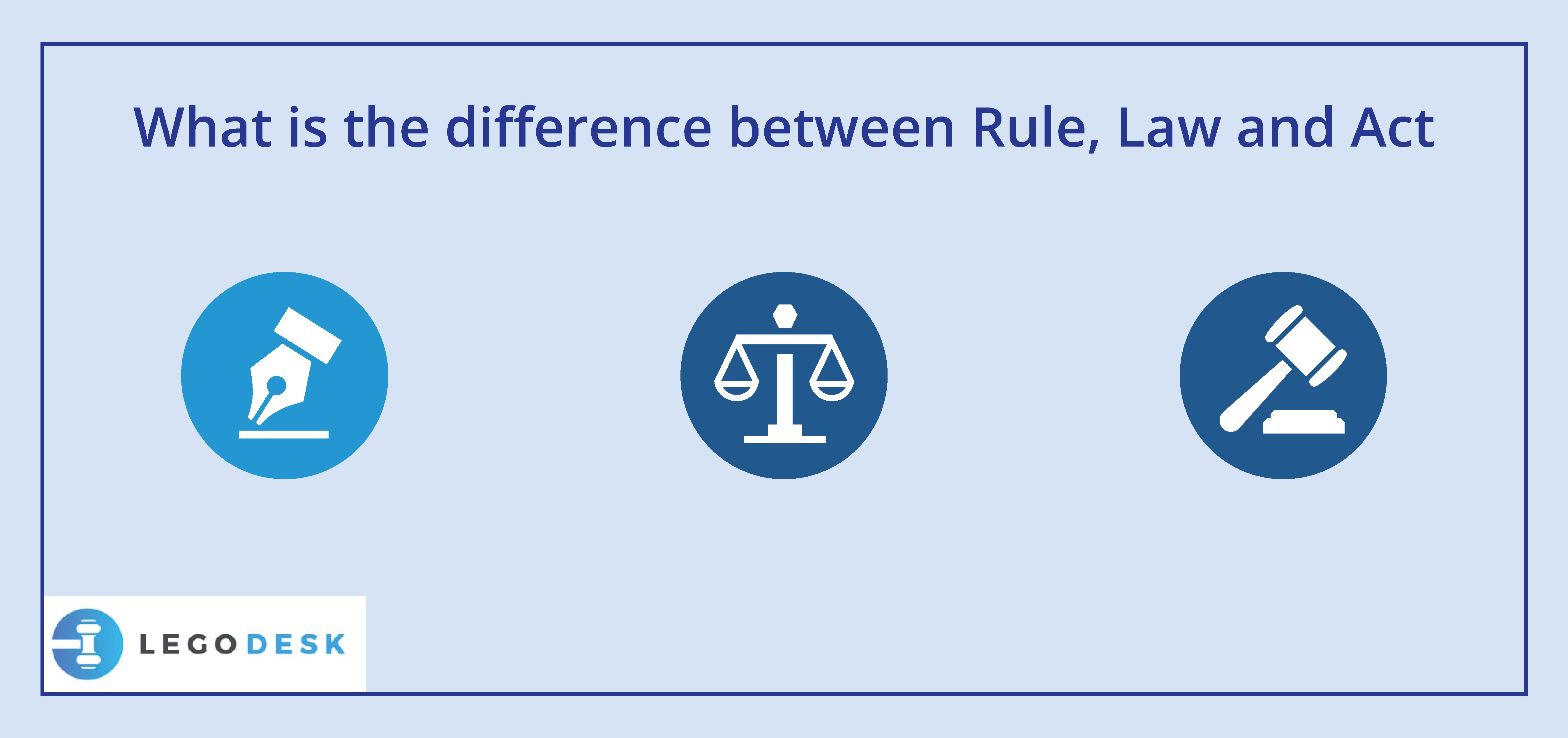The words Rule, Law and Act –
The words Rule, Law, and Act is almost interchangeably used in the subject of legal studies. They are three of the most common words when we read any content of the law. Though they seem similar, they aren’t the same. There are differences between them.
The term ‘Law’ –
Law is a body or a system of rules that are created and enforced through social or governmental institutions to regulate and oversee the behavior of the individuals living in society. Law has the authority of the sovereign. Any deviation by individuals or groups from the law could lead to punishment. It is impossible to define law as such since there is no unanimous consensus among thinkers and jurists on the same. Here are some of the important definitions of law –
John Austin regards law as the aggregate set of rules set by a man as politically superior, or sovereign to men, as political subjects.
Roscoe Pound considered the law to be a tool of social engineering.
Grotius regarded law as a rule of moral action obliging to that which is right.
To put it, the law in today’s time is essential for protecting one from others and for providing a set of rules for basic forms of social life with regards to contract, property, family relations, and other such matters.
Read Also – Legality of House Arrest – How do You Get House Arrest
The term ‘Act’ –
The term ‘Act’ refers to a bill which has been passed through various legislative steps to become an enforced law. So, the act is the statute which in India needs to be passed by both the Houses of the Parliament (Lok Sabha and Rajya Sabha) to be operative. These are known as primary legislation. There are many acts in India dealing in various aspects of the law. Some are substantive while some are procedural, while some can also be private and public.
Examples of Act in India include – The Indian Penal Code, 1860; The Indian Contract Act, 1872; The Indian Evidence Act, 1872; The Juvenile Justice Act, 2015, etc.
The term ‘Rule’ –
Rule, in lay man’s term, means anything which needs to be followed. Rules are standard guidelines which provide for the smooth functioning of an organization. According to Dictionary.com, ‘rule’ means -“a principle or regulation governing conduct, action, procedure, arrangement, etc.”
A rule can be enforced at all levels, be it low or high. For example, a teacher might make a rule that students have to submit their homework on time. Rules vary in their level of strictness.
In law, rules define the procedures of performing a task. It is the acts (legislation) that contain the rules.
Read Also – Important subject for becoming Lawyer
What is the difference between Rule, Law, and Act?
Act and Rule (Difference) –
An act is a law or the statute which has been passed by the legislature and approved by the President of India.
Rules, on the other hand, help in governing law. They are secondary. They are in place to make the parent Act work effectively. Rules provide the details which have not been provided for in the Act. However, Rules by no means can go beyond the power conferred by the Act, or extend the same.
Act and Law (Difference) –
An Act refers to the statutes created by the legislature and approved by the President.
Law is a system of principles and rules which governs the affairs of the society and can be enforced by the concerned authority. In most countries of the world, the law has the backing of the State.
An Act is more specific, whereas the law is more generic.
An Act is a bill, but the law is an established phenomenon.
Law is before Act. If there is no law, there is no Act or Rule.
An Act tells us about why and how laws are enforced whereas, laws tell us about what should and should not be done.
The objective of an Act is to inform people about rules and regulations about specific situations, whereas, the objective of the law is to protect people from unfair practices and to maintain public order.
Read Also – 7 Attorney Business Cards Rules
CONCLUSION –
Though the term Rule, Law and Act are used frequently by the people. Imagine a situation when there is no law or an act for anything, then what is going to happen in society? There will be chaos and anarchy in society. Law contains the acts and the rules, and they are extremely vital for the proper organization and functioning of the administration of the country. These aim at resolving matters of people in a fair and just manner to help the society be peaceful.
In terms of authority, we can say that Law is more powerful and then comes the Act. In the Act, which is the legislation, comes the Rules.
Therefore, Law > Act > Rule.
Try Your All in one legal practice management software – Sign Up Now!



rajeev kumar
May 20, 2020i had cleared my confusion through this article. thank you
Nitin R Jani
November 2, 2021For how many casual days absence are high court judges entitled for all over India.